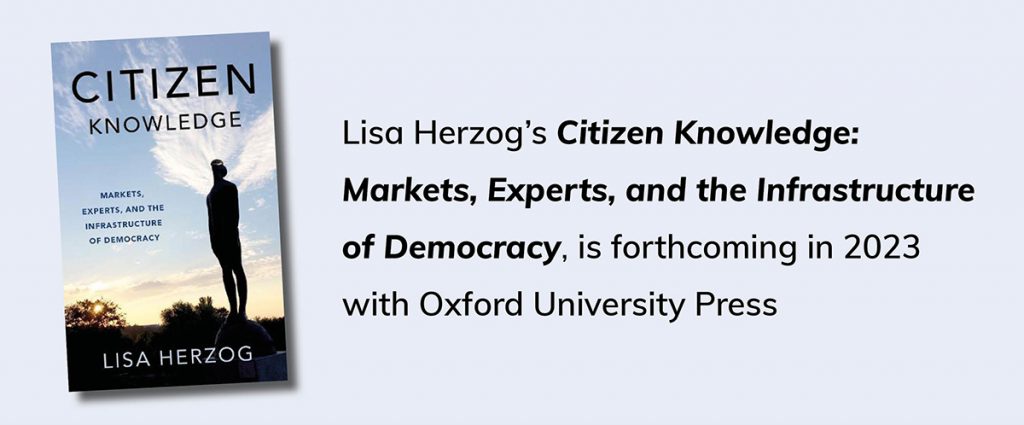'Political epistemology' is a new branch of political theory dealing with the relationship between knowledge and politics. Theorists disagree whether epistemology delivers reasons for or against democracy. But, writes Lisa Herzog, the better question is: what epistemic infrastructures do democracies need to function well? And are we doing enough to preserve these infrastructures?
As democratic citizens, we want our governments to function reasonably well. One key dimension of 'functioning well' is that democratic governance systems deal well with knowledge. They need to integrate expert knowledge about, say, coronaviruses or climate change into their decision-making structures.
At the same time, they must not fall into the trap of technocracy, handing over decisions that should be taken by the people’s representatives to non-elected experts. In times of fake news, distrust in experts, and flourishing conspiracy theories, this is no easy task. And arguably, in recent years, many democratic societies have not done enough to tackle it. The Brexiteer’s rallying cry that 'people have had enough of experts' is symptomatic of deeper problems in the relationship between democracies and knowledge.
If knowledge is power, and all power is political, how should we think about the relation between experts and citizens?
'Political epistemology' is a branch of normative theorising that reflects on these problems and looks for solutions. If knowledge is power, and all power is political, how should we think about the relation between experts and citizens? What role do new communication technologies play, with their potential to make knowledge widely accessible, but without any filters? What does the existence of 'epistemic injustice' mean for democratic decision-making?
One debate in this field is whether democracy itself, with its practices of public deliberation and voting, has epistemic advantages. Some theorists hold that it can harvest the 'knowledge of the many' for the sake of better government decisions. Another camp, however, is pessimistic about democracy’s epistemic balance sheet. These thinkers argue for 'epistocratic' strategies that promise better outcomes. But this comes at the price of giving up core democratic principles, such as 'one person, one vote'.

In my new book, I argue that this way of asking the question is misguided. There are strong normative reasons for democracy: it reflects the equal moral status of all citizens. And there are no reasons to think that real-life democracies are doing so badly with regard to epistemic outcomes. Even though citizens may lack political knowledge, they can use heuristics or rely on intermediary organisations such as unions. And, most importantly: we can take steps that improve the ways in which democratic systems deal with knowledge.
Democratic governance systems can work better or worse depending on the economic, social, and cultural conditions in which they take place. This also holds for their epistemic qualities. What education do the citizens of such systems have access to? What structures exist for integrating independent expertise into legislative processes? Does the media system fulfil the needs of the citizenship as a whole and of specific communities within it? While we can answer these questions at a certain level of abstraction, we also need to take into account the historical and geographical variety of institutions.
'Epistemic infrastructures' are public goods that democracies need to provide to their citizens – although some elements can also be provided by private suppliers
I use the term 'epistemic infrastructures' for thinking about these preconditions for epistemically well-functioning democracies. This terminology is meant to imply that these are public goods that democracies need to provide to their citizens, although some elements can also be provided by private suppliers. Examples of such infrastructures are schools providing knowledge about democratic practices, media that report even-handedly about politics, and regulation of social media that prevents it from creating threats to democracy.
If no attention is paid to the epistemic infrastructures that empower citizens to govern themselves, democracies become vulnerable to the dual threat of technocracy and populism. To prevent this, one needs to widen the scope of democratic theory. Instead of looking only at parliamentary debates or citizens’ attitudes, one needs to take into account a broader range of institutions. They matter for how well democracies function, epistemically speaking.
If we ignore the epistemic infrastructures that empower citizens to govern themselves, democracies become vulnerable to the dual threat of technocracy and populism
This brings democratic theory into dialogue with other lines of research that explore the role of specific institutions or practices for societal knowledge. Take, for example, discussions in media studies about the role of the press in democracies. Or take proposals for democratic schools that prepare kids for being good citizens. Political epistemology creates a bridge between these contributions and democratic theory.
And ultimately, there is also a self-reflexive loop, at least for those of us who spend their days as 'experts'. The political-epistemological perspective invites us to ask how our own scholarship aligns with democratic values, e.g., whether it favours the perspectives of certain groups over others, or how we make it available to citizens and politicians. As experts, we hold a special responsibility – and we owe it to our fellow citizens to use it in democratic ways.